Hello Movies & TV Shows community
Social critique in films is often found in obscure drama or science fiction films and usually includes an underlying message, but with Demolition man (1993), Stallone broke the wall of critique and added explosions to the genre, he had no underlying message, it was evident and In your face critique.
This film found its way into the hearts of the people and attained a cult following, as if we look at our current days, its critique hits a lot of marks and was proven partially right on their claims for the future, because it was the only kind of dystopic future that could happen, and modern political correctness has come to build up our new society as a whole, so join me while we take a deep look into San Angeles and its social critique.
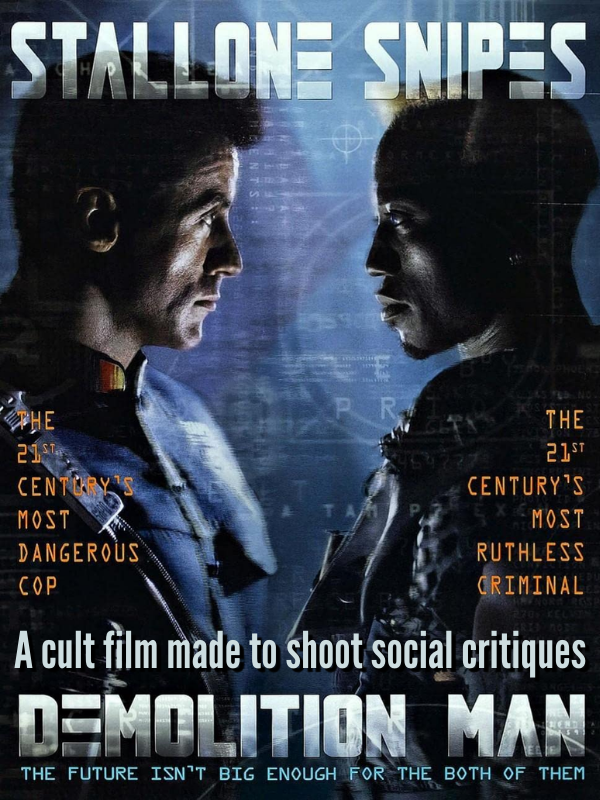
Provided by Warner Bros through the website Imdb, and modified by me on Canva.
In several scenes of the film, we can clearly see the main character, John Spartan (Sylvester Stallone), say a bunch of profanities, and would get instantaneously a fine for doing so, this kind of passive censorship is hardly as offensive as it seems, yet in real life, people would find it hideous to be controlled in such a way.
Imagine that if you say five insults in the privacy of your home, and an omnipresent AI that somehow is present even in the privacy of your bathroom, will call the police on you to "protect" your mental sanity, and help you out of that "negative" way of thinking.
So in the film, we can easily see how there is an absolute lack of freedom of choice and how people decided to live it in the form of self-censorship, of course, you could argue that the most advanced AI assistant I have ever seen in a 90s film is some kind of language moderator, but it goes far beyond that.
We can see things in the film that are gone from the hands of the public, for example, people in the film no longer use paper, even more so with toilet paper, so why not take a bunch of fines that are printed on "the non-existing" paper, and use them for bathroom purposes. It seems like people aren't making paper in the future for the good of the environment, but if it is used for government-issued cash grabs, then it is ok to make it and print it, and that is not the only modern-day nonsense we see in the film.
The billionaire creator of the society in the film Dr. Raymond Cocteau(Nigel Hawthorne), is shown in the film to be burning wood (that in the film is said to be extinct) for lighting and eating meat (also extinct) during the private meal, meaning that no one except him had such luxuries as both things were forbidden to common people. If this does not ring a bell with billionaires in the modern day saying that their private jets do not aid global warming yet ask the regular everyday Joe to face winter with no heating, I just would not know how to point it for you.
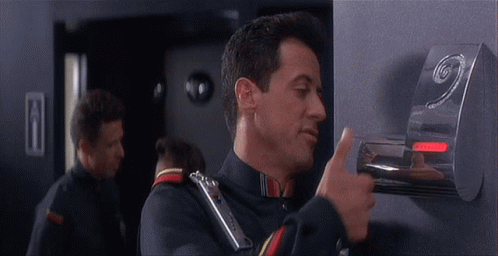
Provided by Tenor.
If we look at cult films, they are often overlooked by the media, and it is more common if they had any kind of social critique added into their mix, so it is hard to look at Demolition man as part of the genre as it was a "macho bravado" film that got the media attention on the big screen.
In the year 1993, people didn't see it as a cult film of a possible future to look at and took it lightly as it was embraced like an action/shooter film that had some "interesting" creative choices like a great yet cartoonish villain and an almost useless brain-dead action hero.
With time, most of its critique about social correctness has proven valid, and modern-day YouTube profanity censorship is an example of it, in the modern day, most YouTubers had to rethink their trademarks when they started censoring videos into age-restricted categories.
If we go to Twitter webspace we can easily see how a war is being fought over pronouns and words, something that would never seem possible in 1993, yet it is easy to notice how it can correlate with this film, as the deep social control San Angeles has and how people regulated themselves for the greater good of society ends up becoming real in the film.
So what is there to know once we establish it as a cult film with a following that pushes it into the spotlight? How its critiques hit the nail in such a way that is common day-to-day stuff in this current year, is something that amazes me deeply, and I'm not the only one.
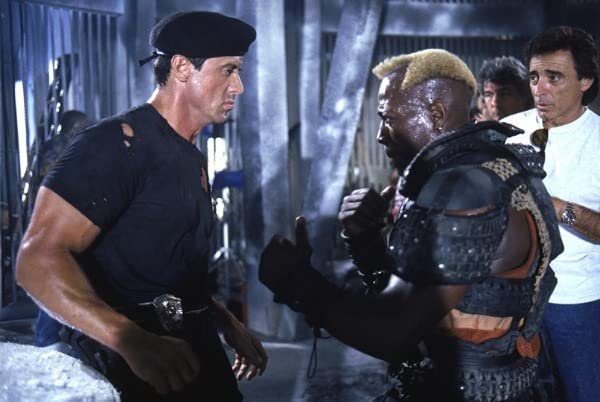
Provided by Imdb.
Then it comes to the whole "credits" as a currency, where we see them trade, use, and make payments on some kind of currency that does not exist physically, yet as the AI seems to be keeping taps, functioning like both a bank and a government official of sorts. Making the ever-looming presence of being replaced by AI even scarier for me now, as with time we have seen that AIs like Chat GPT are evolving way past their original limits and into the depths of working spheres, we can see clearly that ever-present assistants as the ones of the film are not far off from happening, and a lot of people want them to happen in the first place.
These Ais would make wonders if the credit system they used were like modern-day cryptocurrencies, or better, yet we will have to see what the future holds for us in real life, as in this film, the idea of a computer algorithm-based currency never showed up.
We also get similarities like the whole "No touching" so diseases cant transfer and the no contact salutes that the film depicts that are wonders to me as a post covid society member, so you can imagine how much they nailed this whole ordeal into reality.
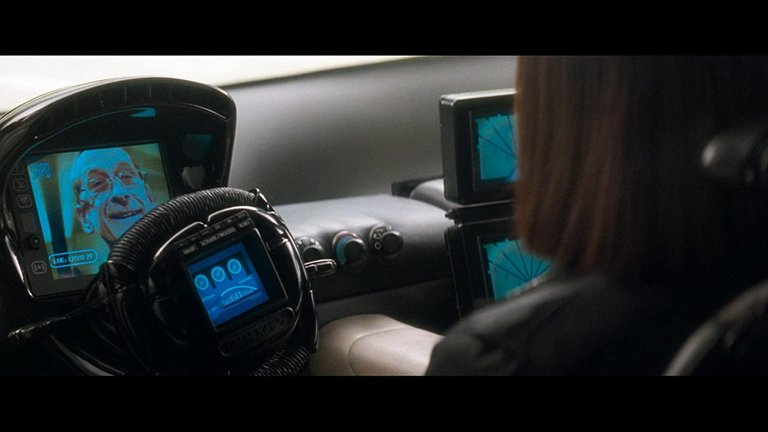
Provided by Imdb.
Now about the villains of the story, they are wildly different yet represent the same phenomena, the mass murderer and maniac Simon Phoenix (Wesley Snipes) and the less violent revolutionary of history, Edgar Friendly (Denis Leary), are both equal representations of the "ultimate freedom" in the film yet they both feel kind of underdeveloped.
On one side, we can see how much of a crazy man is Simon, which is easy to see even from its character design, yet Edgar seems like an everyday American, someone that does not want to be forbidden to eat, talk and live the way they like it, and would feel more comfortable if they are given the freedom to choose what to do. So why is Edgar so bad in the eyes of the government (Dr. Raymond Cocteau) that freed Simon into future days in the first place?
Edgar Friendly represents the indifferent population, those that just want to have a peaceful and quiet life, enjoying what they love and not involving themselves in politics, he could take over the government, in fact by the end of the film he does anyway, but he didn't want to.
Edgar's only goal was to have a decent hamburger, smoke a cigarette and eat meat, something we could all relate to, as he is free to do so, yet how it relates to Simon, the killer maniac?

Provided by Tenor.
John spartan is aware of being a madman, and Simon Phoenix is also aware he has gone mad, yet it is the kind of focused and blood cold mad that both of them have that makes you think, so why is Simon the other side of Edgar's coin?
Simon's freedom of choice is exaggerated and compressed into a single been, he has that violent drive that would rather destroy an entire city than have someone take a single piece of a meal out of his hands, John also has it, but he turned into the good rather than the bad, a necessary evil of sorts to have a super cop rather than a mass murderer.
So at the end of things, this film took a more action-packed dilemma, and while Stallone's performance failed to deliver a lot other than punches and bullets, he at least made incredible chemistry with Snipes making the whole duo central to the film and pushed Edgar to the side even if he was the focus of the plot, as he is a libertarian manifesto done into a character. With all things said and done, I have to say one thing from you and any other person out there: I just can't wait to know how the three shells work, I need to know it, I just NEED IT, that crazy three shells joke it still escaping all logical explanations so far.

Provided by Tenor.
I hope you had a blast from the past with this film review and if you ever saw it and want to talk about it or would like to see it after you read this post, I will read you in the comments section below.

¡Hola comunidad de Movies & TV Shows!
La crítica social en el cine se encuentra a menudo en películas dificiles de ver que suelen ser de drama o ciencia ficción e incluyen un mensaje subyacente, pero con Demolition man (1993), Stallone rompió el muro de la crítica y añadió explosiones al género, no tenía ningún mensaje subyacente, era una crítica evidente y descarada.
Esta película se hizo un hueco en los corazones de la gente y consiguió seguidores de culto, ya que si miramos a nuestros días actuales, su crítica da en el clavo y se demostró parcialmente acertada en sus pretensiones para el futuro, porque era el único tipo de futuro distópico que podía suceder, y la corrección política moderna ha venido a construir nuestra nueva sociedad en conjunto, así que acompáñenme mientras echamos un vistazo profundo a San Ángeles y su crítica social.
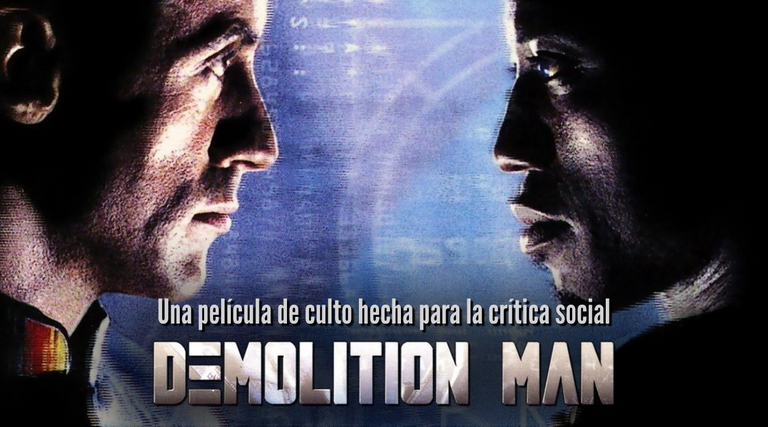
Poster promocional provisto por Warner bros a traves del portal Flixster, modificado por mi en Canva.
En varias escenas de la película, podemos ver claramente al personaje principal, John Spartan (Sylvester Stallone), decir un montón de blasfemias, y recibe instantáneamente una multa por hacerlo, este tipo de censura pasiva no es tan ofensiva como parece, sin embargo, en la vida real, a la gente le parecería horrible ser controlada de tal manera.
Imagina que si dices cinco insultos en la intimidad de tu casa, una IA omnipresente que de algún modo está presente incluso en la intimidad de tu baño, llamará a la policía para "proteger" tu cordura mental, y ayudarte a salir de esa forma "negativa" de pensar.
Así que en la película, podemos ver fácilmente cómo hay una absoluta falta de libertad de elección y cómo la gente decidió vivirla en forma de autocensura, por supuesto, se podría argumentar que el asistente de IA más avanzado que he visto en una película de los 90 es una especie de moderador del lenguaje, pero va mucho más allá de eso.
Podemos ver cosas en la película que han desaparecido de las manos del público, por ejemplo, la gente en la película ya no usa papel, más aún el papel higiénico, así que por qué no coger un montón de multas que están impresas en el "inexistente" papel, y usarlas para ir al baño. Parece que la gente no fabrica papel en el futuro por el bien del medio ambiente, pero si se utiliza para sacar dinero a la gente por parte del gobierno, entonces alli está bien fabricarlo e imprimirlo, y ese no es el único disparate moderno que vemos en la película.
El multimillonario creador de la sociedad en la película, el Dr. Raymond Cocteau (Nigel Hawthorne), aparece en la película quemando leña (que en la película se dice que se ha extinguido) para alumbrarse y comiendo carne (también extinta) durante la cena privada, lo que significa que nadie excepto él tenía tales lujos, ya que ambas cosas estaban prohibidas para la gente común. Si esto no le suena a los multimillonarios de hoy en día, que dicen que sus jets privados no contribuyen al calentamiento global, pero piden al ciudadano de a pie que se enfrente al invierno sin calefacción, ya no sé cómo más señalárselo.
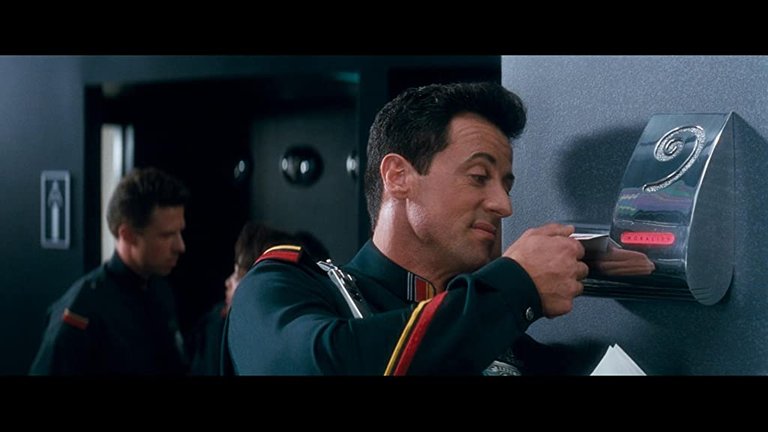
Provisto por Imdb.
Si nos fijamos en las películas de culto, a menudo son pasadas por alto por los medios de comunicación, y es más común si tenían algún tipo de crítica social añadida a su mezcla, por lo que es difícil mirar a Demolition man como parte del género, ya que era una película de "bravuconadas de machos" que llamó la atención de los medios en la gran pantalla.
En el año 1993, la gente no la veía como una película de culto de un posible futuro al que mirar y se la tomó a la ligera, ya que fue acogida como una película de acción y disparos que tenía algunas opciones creativas "interesantes", como un villano genial pero caricaturesco y un héroe de acción con una casi muerte-cerebral e inútil.
Con el tiempo, la mayor parte de su crítica sobre la corrección social ha demostrado ser válida, y la censura de blasfemias en YouTube es un ejemplo de ello, en la actualidad, la mayoría de los YouTubers tuvieron que replantearse sus marcas cuando empezaron a censurar los vídeos en categorías restringidas por edad.
Si vamos al espacio web de Twitter podemos ver fácilmente cómo se está librando una guerra por los pronombres y las palabras, algo que nunca parecería posible en 1993, sin embargo, es fácil darse cuenta de cómo puede correlacionarse con esta película, ya que el profundo control social que tiene San Ángeles y cómo la gente se regula a sí misma por el bien mayor de la sociedad acaba haciéndose real en la película.
Entonces, ¿Qué hay que saber una vez que la establecemos como una película de culto con un seguimiento que la empuja hacia el centro de atención? Cómo sus críticas dan en el clavo de una forma tan cotidiana en este año en curso, es algo que me asombra profundamente, y no soy el único.
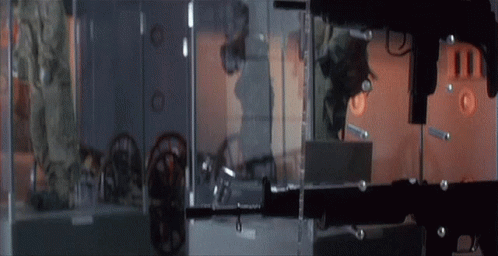
Provisto por Tenor.
Luego viene el tema de los "créditos" como moneda, donde les vemos comerciar, usar y hacer pagos con algún tipo de moneda que no existe físicamente pero que la IA parece estar controlando, funcionando como un banco y como una especie de funcionario del gobierno. Lo que me da aún más miedo ahora es la inminente posibilidad de ser sustituido por una IA, ya que con el tiempo hemos visto que las IAs como Chat GPT están evolucionando más allá de sus límites originales y adentrándose en las profundidades de las esferas de trabajo, podemos ver claramente que los asistentes omnipresentes como los de la película no están lejos de suceder, y mucha gente quiere que sucedan en primer lugar.
Estas IA's harían maravillas si el sistema de crédito que utilizaran fuera como las criptomonedas actuales, o mejor, aunque habrá que ver qué nos depara el futuro en la vida real, ya que en esta película, la idea de una moneda basada en algoritmos informáticos nunca apareció.
También tenemos similitudes como todo el "No tocar" para que las enfermedades no puedan transferirse y los saludos de sin contacto que la película muestra que son maravillas para mí como miembro de la sociedad post covid, así que puedes imaginar hasta qué punto acertaron todo este calvario en la realidad.

Provisto por Giphy.
El asesino de masas y maníaco Simon Phoenix (Wesley Snipes) y el revolucionario menos violento de la historia, Edgar Friendly (Denis Leary), son ambos representaciones iguales de la "libertad definitiva" en la película, sin embargo, ambos se sienten un poco subdesarrollados.
Por un lado, podemos ver lo loco que está Simon, lo cual es fácil de ver incluso desde el diseño de su personaje, sin embargo Edgar parece un americano corriente, alguien que no quiere que se le prohíba comer, hablar y vivir como le gusta, y que se sentiría más cómodo si se le diera la libertad de elegir qué hacer. Entonces, ¿Por qué Edgar es tan malo a los ojos del gobierno (Dr. Raymond Cocteau) que liberó a Simon en los días futuros en primer lugar?
Edgar Friendly representa a la población indiferente, aquellos que sólo quieren tener una vida pacífica y tranquila, disfrutando de lo que les gusta y sin involucrarse en política, podría hacerse con el gobierno, de hecho al final de la película lo hace de todas formas, pero no quería.
El único objetivo de Edgar era comerse una hamburguesa decente, fumarse un cigarrillo y comer carne, algo con lo que todos podríamos identificarnos, ya que es libre de hacerlo, sin embargo, ¿Cómo se relaciona con Simon, el maníaco asesino?
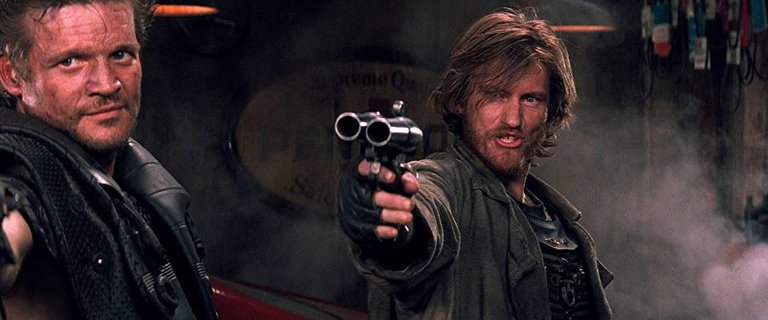
Provisto por Imdb.
John spartan es consciente de ser un loco, y Simon Phoenix también es consciente de que se ha vuelto loco, sin embargo es el tipo de locura concentrada y fría como la sangre que ambos tienen la que te hace pensar, ¿Por qué Simon es la otra cara de la moneda de Edgar?
La libertad de elección de Simon es exagerada y comprimida en un solo ser, tiene ese impulso violento que preferiría destruir una ciudad entera a que alguien le quitara un solo trozo de comida de las manos, John también lo tiene, pero se convirtió en el bueno en lugar del malo, una especie de mal necesario para tener un superpolicía en lugar de un asesino en masa.
Así que al final de las cosas, esta película tomó un dilema más lleno de acción, y mientras que la actuación de Stallone no pudo ofrecer mucho más que puñetazos y balas, al menos hizo una química increíble con Snipes haciendo de ellos el corazon central de la película que empujó a Edgar a un lado, incluso si él era el foco de la trama, ya que es un manifiesto libertario hecho en un personaje.
Con todo lo dicho y hecho, tengo que decir una cosa de usted y cualquier otra persona por ahí: No puedo esperar a saber como funcionan las tres conchas, necesito saberlo, simplemente LO NECESITO, esa loca broma de las tres conchas sigue escapando a todas las explicaciones lógicas hasta ahora.
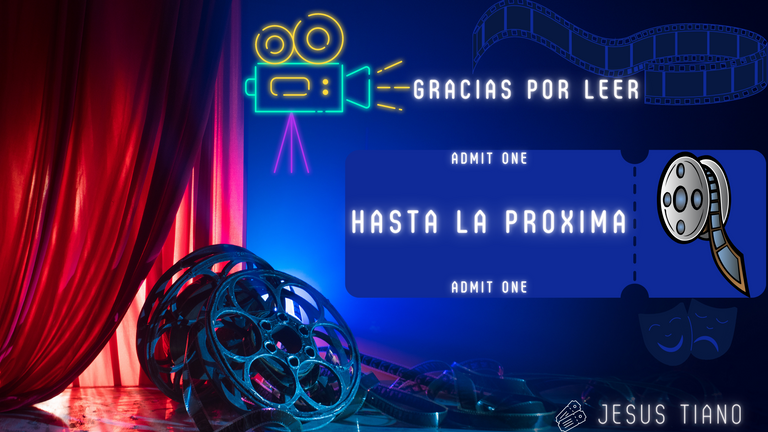
Espero que hayas pasado un buen rato con esta crítica de cine y si alguna vez la has visto y quieres hablar de ella o te gustaría verla después de leer este post, te leo en la sección de comentarios más abajo.
La fuente del separador entre inglés y español, Source basada en el material promocional del filme provisto por Imdb.